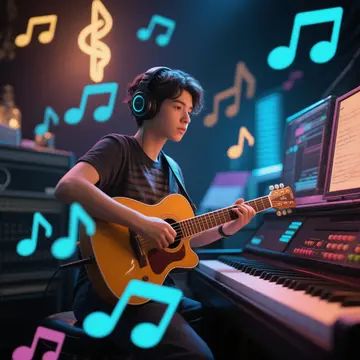Introduction: Can AI Artists Perform at Music Festivals?
It’s 2025, and the music festival landscape has changed dramatically. From Coachella to Web3-native metaverse fests, the presence of AI singers—virtual artists powered by generative music models like Suno, Udio, or AIVA—has grown from a novelty to a legitimate headline act.
But how does it actually work?
Can AI singers apply to perform at music festivals?
If so, what do organizers expect from a non-human act?
This guide breaks down the application process, what you’ll need to showcase, how to pitch your AI singer effectively, and which festivals are open to virtual acts in 2025.

Why Music Festivals Are Welcoming AI Performers
AI singers bring unique benefits to festivals:
Fully customizable performance visuals (3D, AR, holographic)
No travel or visa complications
High novelty and media attention
Seamless tie-ins with brand partnerships, gaming, and metaverse events
Strong appeal to Gen Z, anime, EDM, and Web3 fans
Festivals like SXSW, MUTEK, Tomorrowland Digital, and Asia’s MetaLive Festival have already featured AI artists, showing there's a market—and a pathway.
What You Need Before Applying to a Music Festival as an AI Singer
Whether your AI artist is fully virtual or augmented with a real team behind it, you'll need a few essentials:
1. A Solid Artist Identity and Persona
Name, genre, vocal tone (e.g., trained on Suno or Synthesizer V)
Visual branding (3D avatar, character design, music video screenshots)
Social links (TikTok, YouTube, Spotify, Instagram)
Use tools like Ready Player Me, ZEPETO, or VRoid Studio to build animated personas. Make sure the visual identity aligns with your music style.
2. A Performance Demo or Virtual Showcase
A short video (1–3 minutes) demonstrating what your AI singer’s live show could look like
This could include hologram previews, avatar lip-syncing, or a virtual crowd performance
Use platforms like Volta XR, Notch, or Unity with Mixamo to simulate performances.
3. A Professional EPK (Electronic Press Kit)
Your EPK should include:
Artist bio (written in character if relevant)
Performance demo link
Social and streaming stats
Visual assets (logos, images, character renders)
Tech rider or software needs (e.g., screen size, visuals format, audio routing)
Even for AI singers, professionalism is key to festival credibility.
Where to Find Music Festivals That Accept AI Artists
Here are real 2025 examples of festivals that have embraced virtual or AI performers:
| Festival Name | Format | Notes |
|---|---|---|
| SXSW (USA) | Physical/Hybrid | Accepts AI tech showcases and music acts with innovative edge |
| MUTEK (Canada) | Physical/Virtual | Celebrates audiovisual and electronic innovation |
| Tomorrowland Digital | Virtual | Allows metaverse shows, AI DJ sets, and holographic vocalists |
| MetaLive Festival (Asia) | Virtual/IRL | Focuses on digital twins, VTubers, AI singers |
| NFT.NYC Music Track | Physical | Welcomes synthetic identities tied to Web3 and generative art |
| Asia Pop 40 Festival | Hybrid | Partners with anime/virtual musicians with K-pop/EDM appeal |
How to Apply to a Music Festival as an AI Singer
Step 1: Research the Right Festival
Focus on festivals that:
Feature EDM, pop, anime, cyberpunk, or experimental music
Already feature VTubers, holograms, or digital artists
Accept open calls or artist submissions (usually Jan–Apr each year)
Step 2: Prepare a Custom Application
Tailor your pitch to the festival:
Highlight how your AI singer enhances the experience (visuals, narrative, tech)
Offer flexibility: can perform via livestream, on-screen, hybrid, or avatar drop-in
Emphasize social engagement: TikTok reach, Discord fanbase, etc.
Step 3: Submit via Their Platform or Direct Email
Most festivals use one of the following:
Gigmit
Sonicbids
Direct forms on the festival’s website
Email to booking team (include subject: “AI Artist Submission – [Name]”)
Follow up 2 weeks after submission, if no response.
Key Tips to Boost Your AI Singer’s Chances
Showcase originality, not just tech. Festivals want to connect emotionally with the audience—even if the singer is virtual.
Tie into cultural themes (e.g., climate, identity, posthumanism) to make your AI persona meaningful.
Have a plan for live interaction, such as real-time chat, Twitch streams, or fan input during performances.
Package your music in accessible formats (MP3, stems, backing tracks) with licensing clearances.
FAQ: AI Singers and Music Festival Applications
Q1: Do festivals treat AI acts like real artists?
Yes. If the pitch is polished and the music resonates, many festivals will judge based on audience value—not whether the performer is human.
Q2: Can AI singers perform live?
They can via pre-rendered sets, interactive livestreams, or holographic projection. Some use voice synthesis + MIDI control for real-time shows.
Q3: Do I need a label or agency to apply?
No. Many festivals accept independent submissions, as long as your package looks professional.
Q4: Can I get paid for AI performances?
Yes. Payment is possible, especially for virtual shows. You may also earn through licensing, NFT ticketing, or brand sponsorships.
Q5: What about copyright and rights issues?
Ensure all your AI-generated vocals and music are either original or cleared for commercial use. Suno, Udio, and Boomy have usage policies—read the fine print.
Conclusion: Music Festivals Are Ready for AI Artists—Are You?
AI singers no longer belong just in sci-fi—they belong on stage, screens, and festival lineups around the world.
Whether you're a one-person creative team using Suno to build a virtual popstar, or a collective developing the next anime-style AI vocalist, there's space for you—if you present it right.
Start building your EPK, craft a visual showcase, and target festivals that align with your genre and message.
In the age of synthetic music, the crowd doesn’t care if you’re real—they care if you’re real good.
Learn more about AI MUSIC

